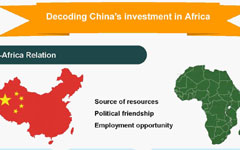It is clear from Premier Li's visit that China is endeavoring to help African countries grow beyond just being resource suppliers
Chinese Premier Li Keqiang has just concluded a four-nation - Ethiopia, Nigeria, Angola and Kenya - visit to Africa, during which he signed numerous deals in areas such as high-speed railways, roads, utilities, agriculture, communications and solar power.
 |
 |
Premier Li's visit gives us an opportunity to consider anew the claim that China's involvement in Africa is nothing more than another form of neocolonialism. At first glance, this assertion has some plausibility given the structure of Sino-African trade, which often involves African countries providing primary goods to China in return for manufactured goods and heavy Chinese investment in Africa's natural resource sector. Upon more serious reflection, however, it is highly questionable to equate China's general involvement in Africa with neocolonialism.
In the past European countries forcibly toppled African governments. European countries totally dominated the economic, cultural, and social life of certain African countries and stationed their militaries in Africa without permission. There is simply no parallel between now and then. And focusing more narrowly on the issue of neocolonialism in the realm of economics, which is the real issue, we find African countries asking China to engage with them in tackling the current structure of trade, which they recognize fits contemporary economic realities.
